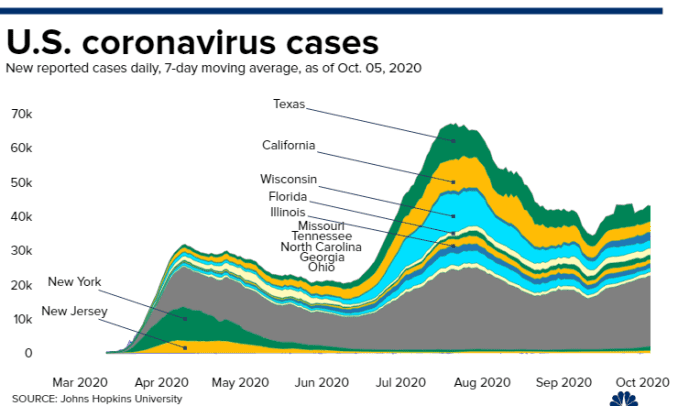Runaway COVID Cases, Death Rate in U.S.
"[America] is in for a hellacious couple of weeks [for COVID-linked deaths to come]."
"This has been so badly mishandled from the get-go in the United States. It's horrible to watch."
"[Canada has an opportunity to learn] from the mistakes of others."
"The relative lack of deaths and severe cases and hospital traffic isn't a function of the disease sort of deciding to not be that big a deal anymore."
"It's directly a result of our actions [such as social distancing]. A very active effort is making things not happen."
"Obviously, the other concern is that this is our next-door neighbour. We're dealt a hough hand, here. The border is federal jurisdiction, and it probably means the federal government needs to step up in terms of getting very serious about how we handle screening travellers coming into Canada, how we deal with quarantine of travellers, and monitoring people to make sure they don't break [the 14-day] quarantine and how we try to think creatively about how we try to keep the disease from being introduced, with truckers coming across the border, back and forth."
"It's worth remembering that, even back in February, we saw this grumbling start to these epidemics, where we were importing cases and importing cases and we did not have an exponential growth. And then in early March it suddenly exploded."
Dr.David Fisman, head, division of epidemiology, school of public health, University of Toronto

"If we re-open too much we will see rises in cases, too. [We are] epidemiologically [no] different."
"It's still right here with us, like embers in a dry forest. [We've slowed the curve with severe actions, not with immunity]."
"[We should be ready for a] re-closing [should we see a case surge]. We should understand that it takes time to see changes, we won't know right away and we risk infecting people now who will need care in a few weeks' time [should we fail to continue physical distancing."
"Staying physically away from each other, consistently, works and it is the only thing we know [that] works. [While masks help as does hand-washing] we don't know how much. To my knowledge, there is nowhere in the world that masks and contact tracing as the only interventions have worked to keep COVID-19 at bay while social activities and contacts were near normal."
Caroline Colijn, disease modelling expert, Simon Fraser University
 |
An employee sweeps inside a closed bar in Austin, Texas, June 26, 2020.
Sergio Flores | AFP | Getty Images
|
In the United States, case counts continue to swell to record highs in southern and western states daily. Bars were ordered closed in Los Angeles and an additional six California counties, when health officials stated that liquor makes people less compliant with physical distancing and mandatory face masking. For the Fourth of July holiday weekend, Florida has closed bars and beaches in response to the steadily rising cases which has become a phenomenon in no fewer than sixteen states.
The Trump administration is busy putting a optimistic view front and forward, claiming the crisis appears "different than what we saw two months ago", a statement delivered by U.S. Vice-President Mike Pence, leading the White House coronavirus task force. Of the confirmed new cases in Florida and Texas half are being seen in under 35s; "encouraging news", according to Mr. Pence since younger people appear to be less susceptible to serious infection outcomes.
 |
| The three most populous U.S. states, California, Florida and Texas are breaking coronavirus records, leading to fears of 'apocalyptic' surges. (Chandan Khanna AFP/Getty Images/CNN) |
Daily updates in Canada of new cases and deaths are descending in numbers, along with falling hospital admission rates while recoveries are increasing in numbers, according to a newly=released federal modelling update. Among the elderly in particular, given the carnage seen in long-term care homes in the past few months -- contagion rates are down and a steep decrease has been seen in transmission among the elderly. Balanced by a slight increase among 20- to 39-year-olds.
There have been clusters of infection, however, some flare-ups in Ontario and Alberta. The most serious of them has taken place when over 180 mostly migrant farm workers tested positive over the weekend for COVID-19. It is, however in the United States where case counts are ascending to record daily highs in southern and western states. Even so, Vice-President Pence, looking on the bright side of things a la Monty Python, declares that "We're in a much better place" in comparison to the worst moments of the pandemic two months earlier.

Canada
Coronavirus Cases:104,204
Deaths:8,591
Recovered:67,594
"Only now would we be starting to see the impact of reopening in May and June", Dr.Colijn stated, explaining that hospitalizations lag behind confirmed infections, where it takes time between symptom onset and becoming recognizably ill. Confirmed cases in the U.S. now exceed 2.5 million people, with over 125,000 reported COVID-related mortalities making the U.S. the largest COVID epidemic in terms of recognized cases in the world "by a lot".
Labels: Canada, Novel Coronvirus, United States

0 Comments:
Post a Comment
<< Home